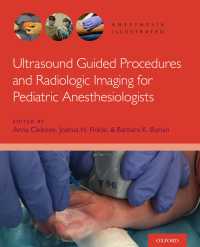Full Description
This book presents recent research on cancer detection methods based on nanobiosensors, which offer ultrasensitive point-of-care diagnosis.
Several methods for diagnosing cancer have been discovered and many more are currently being developed. Conventional clinical approaches to detecting cancers are based on a biopsy followed by histopathology, or on the use of biomarkers (protein levels or nucleic acid content). Biopsy is the most widely used technique; however, it is an invasive technique and is not always applicable. Furthermore, biomarker-based detection cannot be relied on when the biomarkers are present in an extremely low concentration in the body fluids and in malignant tissues.
Thus, in recent years highly sensitive and robust new cancer diagnosis techniques have been developed for clinical application, and may offer an alternative strategy for cancer diagnosis. As such, this book gathers the latest point-of-care cancer diagnostic methods and protocols based on biomedical sensors, microfluidics, and integrated systems engineering. It also discusses recent developments and diagnostics tests that can be conducted outside the laboratory in remote areas. These technologies include electrochemical sensors, paper-based microfluidics, and other kit-based diagnostic methods that can be adapted to bring cancer detection and diagnostics to more remote settings around the globe.
Overall, the book provides students, researchers, and clinicians alike a comprehensive overview of interdisciplinary approaches to cancer diagnosis.
Contents
Cancer Biomarkers: Important Tools for Cancer Diagnosis and Prognosis.- Transcription factors as detection and diagnostic biomarkers in cancer.- Cancer biomarkers immunosensing strategies based on graphene surface engineered materials.- Label-free biosensors for early diagnosis of cancer based on G-quadruplex and isothermal amplification.- Point-of-care and implantable biosensors in cancer research and diagnosis.- Electrochemical Redox Cycling Amplification Technology for Point-of-Care Cancer Diagnosis.- Hyperbolic metamaterials-based ultra-sensitive plasmonic biosensors for early stage cancer detection.- SERS-based biosensors as potential next generation point-of-care cancer diagnostic platforms.- Nucleic acid-based aptasensors for cancer diagnostics - An insight into immobilisation strategies.- Nanobiosensing technologies for prostate cancer diagnostics/prognostics: Tiny smart medicine.- Developments in the Electrochemical Bionanosensors for the Predictive Diagnosis of Prostate andBreast Cancer.- Oligopeptides for Cancer and other Biomedical Sensing Applications.- Microfluidic immunoassay devices as next generation cancer and medical diagnostics platform.- Point-of-care device with plasmonic gold nanoarray sensing chip for biomarker detections.- Sers Biosensing and Bioimaging: Design and Applications in Cancer Diagnostics.- Microfluidic Paper-based Analytical Devices for Point-of-Care Diagnosis.







